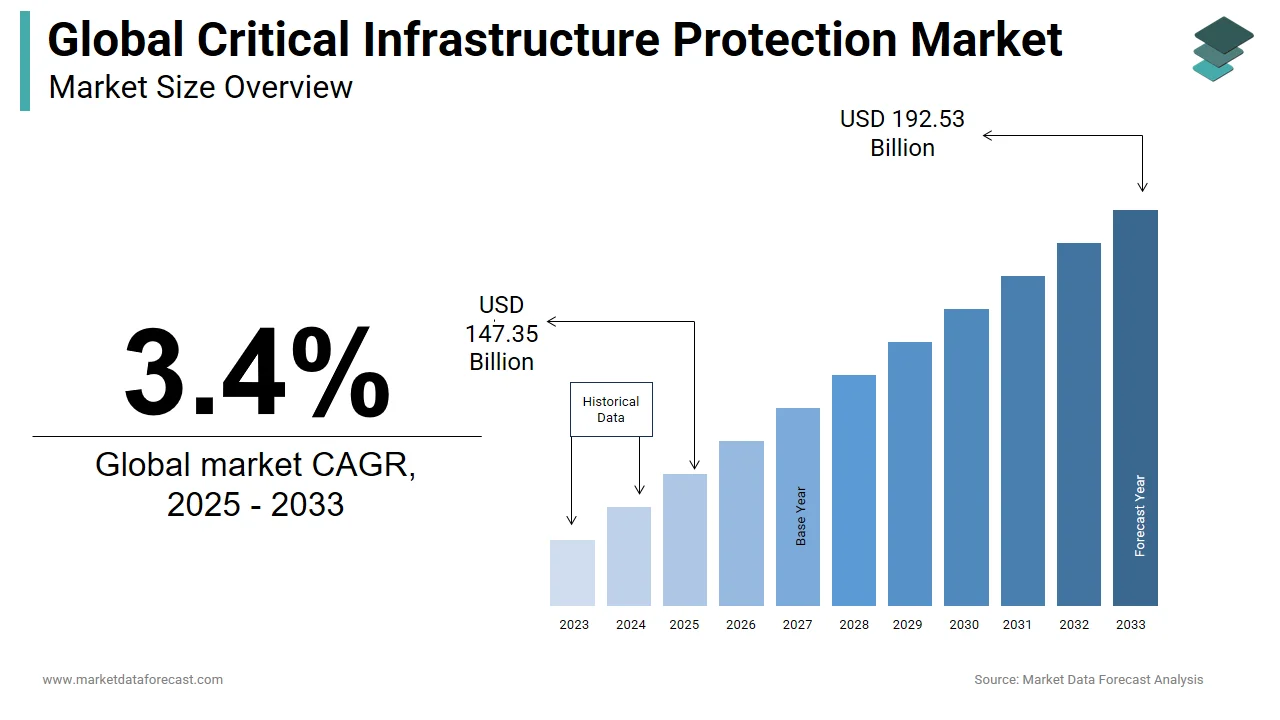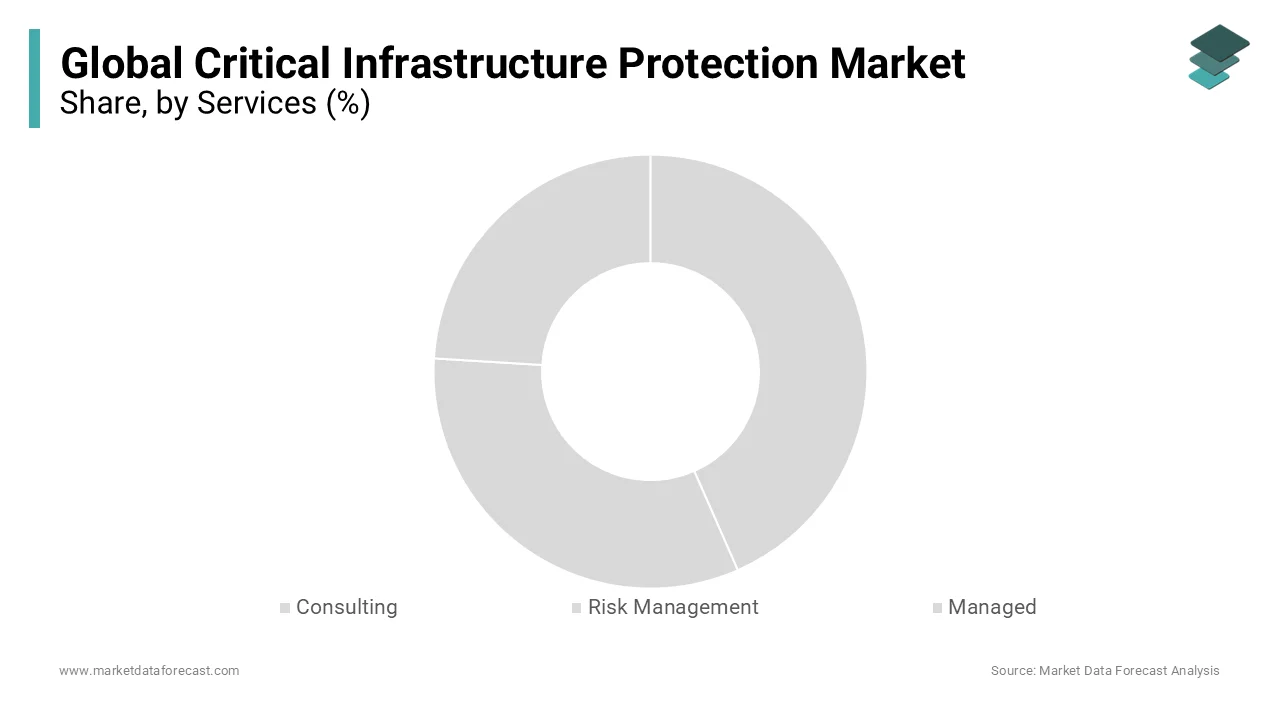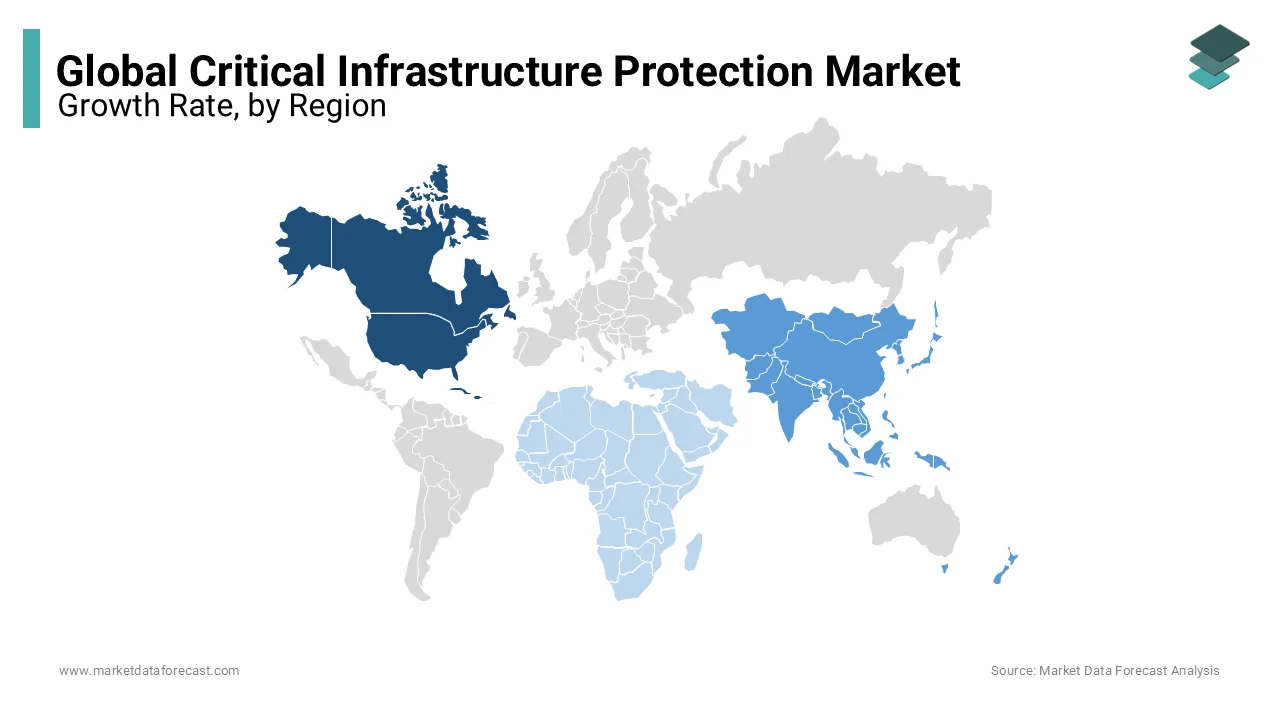Global Critical Infrastructure Protection Market - Size, Share, Trends, & Growth Forecast Report – Segmented by Services (Consulting, Risk Management and Managed), Security Type (OT and IT) & Region - Industry Forecast From 2024 to 2032
Global Critical Infrastructure Protection Market Size (2024 to 2032)
The global critical infrastructure protection market was worth USD 137.81 billion in 2023. The global market is predicted to reach USD 142.50 billion in 2024 and USD 186.20 billion by 2032, growing at a CAGR of 3.4% during the forecast period.

Current Scenario of the Global Critical Infrastructure Protection Market
The rise of cyber threats and security breaches is one of the main growth drivers of the global critical infrastructure protection market. Critical Infrastructure Protection is a concept related to alerting and responding to serious incidents in a region. It includes banking and finance, transportation, food production and distribution, energy, water systems, law enforcement, federal and municipal services, and additional emergency services for the public and private sectors. These Critical Infrastructure Protection systems are necessary for the minimal functioning of the economy and government. In short, these systems serve as the backbone of the national economy, security, and wealth. Protecting critical infrastructure is becoming more automated and interconnected. However, improvements in technology related to infrastructure protection have created new vulnerabilities to equipment failure, human error, and physical and cyber-attacks. Several public and private companies are adopting technology to preserve critical infrastructure from malicious entities, create immediate responses to block suspicious activity, and protect critical systems.
MARKET DRIVERS
The global critical infrastructure protection market is growing as the need to protect and protect sensitive data increases. The implementation of cloud-based services and the implementation of government regulations and practices for homeland security are further accelerating market growth.
Increased awareness of data security and privacy is driving the adoption of critical infrastructure protections that enhance market growth. The growing adoption of IoT and the growing need to protect and protect data is accelerating the growth of the critical infrastructure protection market.
Additionally, there is a rising demand for effective cybersecurity solutions that drive the emergence of advanced cyberattacks and the growth of the critical infrastructure protection business. There is a surge in demand for critical infrastructure protection markets where the need to protect financial, government, energy, transportation and other critical infrastructure operations. The critical infrastructure protection market is expected to grow to increase concerns about data security and protection and reduce the risk of data theft. The growing popularity of the Internet of Things (IoT) is another factor driving the growth of the market. The expansion of the critical infrastructure protection market is explained by growing cyber threats and the implementation of government ordinances and practices for national security. Rising IT spending, the implementation of automation solutions, and efficient policies and regulations are also driving the industry.
Increasing the opponent's ability to penetrate systems that control all areas of critical infrastructure is a nurturing problem in many industries.
In light of this, investments are expanding to encourage cybersecurity R&D to launch advanced critical infrastructure protection solutions. In addition, the government has implemented favorable asset safety policies to support the need for Critical Infrastructure Protection. The rise of IoT applications is driving the growth of the critical infrastructure protection market, with more and more cases of terrorism, virtual and cyber-attacks. It is also accelerating the growth of the critical infrastructure protection market again as security concerns rise in various industries such as transportation, oil and gas, telecommunications, energy, and more. Additionally, increased government investment in critical infrastructure data is another factor driving the growth of the global Critical Infrastructure Protection market. The growing need for physical and cyber security has the potential to drive market demand in the future. The key drivers of the critical infrastructure market are government regulations and practices and the growing number of cyber threats, as many of these organizations are implementing critical infrastructure solutions. As cyberattacks in critical infrastructure areas increase, investment in the physical and information security markets is expected to increase over the forecast period. Critical infrastructure protection solutions implement traditional and modern cybersecurity technologies to ensure greater reliability and better long-term protection.
MARKET RESTRAINTS
The lack of technically trained workforce and information on industrial control systems is a key factor impeding the growth of the global critical infrastructure protection market. Lack of interoperability between security products and high implementation costs are limiting the growth of the industry. It is also difficult to add modern security to existing critical infrastructure. Lack of financial investment and technical complexity in implementing Critical Infrastructure Protection security in developing countries are expected to slow the growth of this market.
REPORT COVERAGE
|
REPORT METRIC |
DETAILS |
|
Market Size Available |
2023 to 2032 |
|
Base Year |
2023 |
|
Forecast Period |
2024 to 2032 |
|
CAGR |
3.4% |
|
Segments Covered |
By Services, Security Type, and Region |
|
Various Analyses Covered |
Global, Regional & Country Level Analysis, Segment-Level Analysis, DROC, PESTLE Analysis, Porter’s Five Forces Analysis, Competitive Landscape, Analyst Overview on Investment Opportunities |
|
Regions Covered |
North America, Europe, APAC, Latin America, Middle East & Africa |
|
Market Leaders Profiled |
BAE Systems, Airbus Group SE, Honeywell International Inc, General Dynamics Corporation, Lockheed Martin Corporation, Northrop Grumman Corporation, Raytheon Company, Teltronic SA, Hexagon AB, Huawei Technologies Co Ltd., Thales Group, Johnson Controls International plc and Motorola Solutions Inc and Others. |
SEGMENTAL ANALYSIS
Global Critical Infrastructure Protection Market Analysis By Services

The consulting services segment dominated the critical infrastructure protection market in 2020 with a value of USD 202.4 billion. CIP provides a strong security posture through comprehensive assessment services coupled with expert advice. The risk management service is expected to witness a CAGR of 11.7% during the forecast period. Many governments are increasingly adopting a risk management approach. The risk management process includes the integration of information on threats, vulnerabilities and results.
Global Critical Infrastructure Protection Market Analysis By Security Type
The operational technology (OT) security segment is expected to remain dominant in the market over the forecast period, accounting for more than 60.0% revenue share by 2026, which may be due to increased implementation of cybersecurity solutions in SCADA. Systems, industrial control systems and other operating technology systems.
The information technology (IT) security segment is estimated to witness a CAGR of 9.8% over the conjecture period. IT security plays an important role in creating the environment necessary to lay the foundation for the successful implementation of e-government or e-commerce activities, national ICT plans and sector projects including finance and education.
REGIONAL ANALYSIS

North America dominated the worldwide critical infrastructure protection market in 2020. The implementation of various agencies and policies of the US government, such as the Presidential National Security Guidelines and the National Infrastructure Protection Program, are contributing to the growth of the local market. Additionally, the implementation of national strategies and action plans for critical infrastructure has established a risk-based approach to complement overall market growth by enhancing the resilience of Canada's core assets and systems.
The Asia Pacific region is estimated to have the highest CAGR of 11.9% during the forecast period. The proliferation of technologies in industrial and defense systems are some of the key factors driving the growth of the regional Critical Infrastructure Protection market. China is likely to experience high growth rates as investments in infrastructure protection hardware and software increase.
The Middle East and Africa are the second fastest growing regions for critical infrastructure protection markets. The high growth of the market is due to the growing number of sensitive infrastructures and organizations in the region, which increases security demands on critical infrastructure and provides flexibility against cyber-attacks.
KEY PARTICIPANTS IN THE GLOBAL CRITICAL INFRASTRUCTURE PROTECTION MARKET
- BAE Systems
- Airbus Group SE
- Honeywell International Inc
- General Dynamics Corporation
- Lockheed Martin Corporation
- Northrop Grumman Corporation
- Raytheon Company
- Teltronic SA
- Hexagon AB
- Huawei Technologies Co Ltd.
- Thales Group
- Johnson Controls International plc
- Motorola Solutions Inc.
RECENT DEVELOPMENTS IN THE GLOBAL CRITICAL INFRASTRUCTURE PROTECTION MARKET
- In December 2019, Raytheon released a disassembled soldier training simulator, a virtual synthetic training environment soldier trainer.
- In September 2019, the US Defense Advanced Research Projects Agency (DARPA) and BAE Systems partnered to develop a new space situational awareness tool.
- In July 2019, Thales launched the Gemalto Digital ID Wallet to allow citizens to easily verify their identity and access official documents from a single secure platform on their smartphone.
DETAILED SEGMENTATION OF THE GLOBAL CRITICAL INFRASTRUCTURE PROTECTION MARKET INCLUDED IN THIS REPORT
This research report on the global critical infrastructure protection market has been segmented and sub-segmented based on the service, security type, and region.
By Services
- Consulting
- Risk Management
- Managed
By Security Type
- Operational Technology (OT)
- Information Technology (IT)
By Region
- North America
- Latin America
- Asia Pacific
- Europe
- Middle East & Africa
Frequently Asked Questions
What specific technologies are gaining traction within the Critical Infrastructure Protection market?
Technologies such as AI-driven analytics, IoT-based security systems, blockchain for secure data management, and biometric access control systems are gaining significant traction due to their effectiveness in enhancing infrastructure security.
How are government initiatives impacting the Critical Infrastructure Protection market globally?
Governments worldwide are implementing various initiatives to bolster critical infrastructure security, including funding programs, regulatory frameworks, and public-private partnerships, thereby driving market growth.
What role do emerging technologies like 5G and smart grids play in shaping the future of Critical Infrastructure Protection?
Emerging technologies such as 5G networks and smart grids introduce new security vulnerabilities, driving the need for innovative protection solutions to safeguard critical infrastructure from evolving threats.
How significant is the role of cybersecurity in Critical Infrastructure Protection, and what measures are being taken to enhance cybersecurity readiness globally?
Cybersecurity plays a pivotal role in Critical Infrastructure Protection, with efforts focused on enhancing threat detection capabilities, implementing robust encryption protocols, and promoting cybersecurity awareness and training programs among infrastructure operators worldwide.
Related Reports
Access the study in MULTIPLE FORMATS
Purchase options starting from $ 2500
Didn’t find what you’re looking for?
TALK TO OUR ANALYST TEAM
Need something within your budget?
NO WORRIES! WE GOT YOU COVERED!
Call us on: +1 888 702 9696 (U.S Toll Free)
Write to us: [email protected]